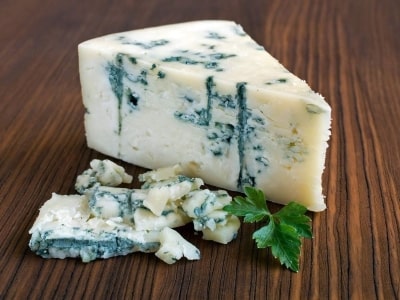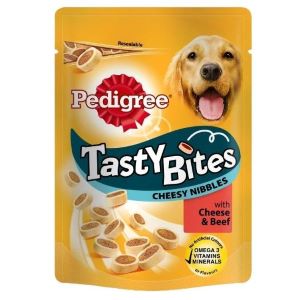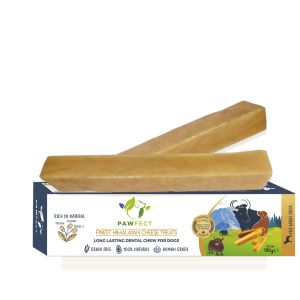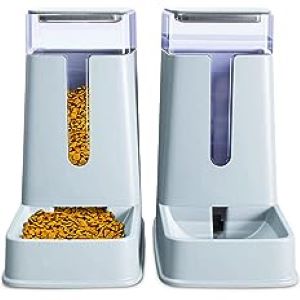Lactose intolerance is a common digestive issue in dogs. It’s not a good recommendation to give dairy products, as they can lead to digestive issues. But, we can’t overlook the fact and may wonder, “Can Dogs Eat Cheese?” and many pet parents use cheese as a reward to train their puppies.
Key Takeaways
- Dogs can safely have cheese but in a small proportion.
- In fact, many dogs are lactose intolerant, so even small chunks of cheese can be unhealthy for them. This is because dairy products are not recommended for dogs as they cause digestive issues.
- Basically, you can feed your dog cheese as an occasional treat, and cannot replace it with a regular meal.
- You can hide a pill or tablet in cheese. This can help when your dog if he doesn’t want to take their medication. However, if you are giving him antibiotics, then it is suggested not to use the cheese trick.

Keep reading to know more about can dogs eat cheese, and what pet parents should watch out for to keep their furry friend’s health safe from getting deteriorated by overeating cheese.
You Might Also Like:
Can Dogs Eat Cheese?
Yes, dogs can safely eat cheese, but only in moderation. In fact, many dogs can only tolerate small portions of cheese, as it is not a natural part of a dog’s diet. Also, if your dog is lactose intolerant or has a milk allergy, even a small amount of cheese could hurt its digestive system.[1]

If you are considering giving your dog cheese then try feeding it in small quantities and monitor the symptoms. If your dog shows symptoms like upset stomach, vomiting, diarrhoea or constipation then consult a vet for advice. If the cheese does not suit your dog then stop feeding it to them.
You can give your dog cheese, but only as a treat and not as a replacement for his regular meal. It is always recommended to consult with a veterinarian before making any changes to your dog’s diet or introducing anything new. They will be able to provide you with better knowledge.
Ways to Feed Cheese to My Dog
After knowing the fact, dogs can easily have cheese, but only in small chunks. Now, look at the different ways of feeding cheese to your furry pal. Here are some feeding tips that will help you safely give cheese to your furry friend.
- While training your fido, feeding small chunks of cheese as a reward can help you to teach him tricky commands.
- If your pet is under any medication and is not taking it on time, then the cheese trick will help you to ensure that he takes his medication on time. You just need to wrap cottage cheese around the pill and give it to your furry friend.
- If you want to add variety to your dog’s diet, you could try adding chunks of cottage or mozzarella cheese to his food.
- Give your dog a Kong toy filled with cream cheese, and he won’t ask for more treats, it will keep him busy.
Note: – If you are giving your furry friend antibiotics, then it is not advised to wrap cheese around the pill, as this will negatively affect its effectiveness.
Side Effects of Having Cheese!
Now we have the answer to the question, “can dogs have cheese?”. But, is cheese bad for dogs if taken in large quantities? We must not overlook the fact that cheese is not the primary ingredient your canine’s body requires on a daily basis. Before feeding cheese to your canine, a few things should be kept in mind.[2]
According to the ASPCA ” Pets do not possess significant amounts of lactase (the enzyme that breaks down lactose in milk), milk and other dairy-based products cause them diarrhoea or other digestive upset.“

Here are a few drawbacks your dog could face if he ingests cheese in large amounts or on a regular basis.
- Dogs are lactose intolerant[1], they cannot digest dairy products. If you feed your dog cheese on a regular basis, then you are damaging his digestive function.
- Cheese does not include any essential nutrients, it only adds calories to your furry’s body. If you overfeed him, it can cause weight gain issues.
- If your dog dislikes the taste of cheese, and you force-feed it, this can lead to issues with vomiting.
- Dogs with kidney issues should not be given cheese because it can lead to other severe health issues.
- If your furry pal is suffering from pancreatitis, simply avoid feeding cheese to him. This is because pancreatitis is a severe underlying health issue, no negligence should be done it can threaten your fido’s life.
These are a few highlighted drawbacks of overfeeding cheese to your furry pal. The same goes for yoghurt – feeding too much can cause digestive upset. But can dogs eat yoghurt in moderation? Additionally, we suggest consulting your local vet to avoid any health problems if your dog accidentally had cheese in large quantities.
What Kinds of Cheese Can Dogs Eat?
1. Cottage Cheese

Cottage cheese is one of the best cheeses for dogs because it has calcium and protein and is low in fat, so it won’t make your dog gain weight. However, remember to use it as an occasional treat and not make it a habit of feeding him on a daily basis.
2. Cream Cheese

There are two types of cream cheese, regular and with a topping like onion, garlic, herbs, or other seasonings. If you want to feed your furry friend, plain cream cheese is a good option, but in a small amount and don’t make it a habit.
Note:-Apart from cottage and cream cheese, there are other variants also, which you easily feed to your canine. Such as mozzarella, Swiss cheese, cheddar cheese, are counted as best cheese for dog to feed.
Types of Cheese That Dogs Can’t Have
1. Blue Cheese

Well, it’s a big no to feed blue cheese to your furry pal. The reason behind this is that the fungus used in the formation of blue cheese is not good for your furry’s health. It produces a substance called Roquefort C, which is not suitable for your furry pal. If he accidentally eats these substances, he can get sick and have diarrhoea, vomiting, or seizures.
If he eats a lot of blue cheese, the consequences will be different, and you need to call a vet right away to avoid future health problems.
2. Feta Cheese

Feta cheese is similar to goat cheese and brie cheese. These types of cheese are high in sodium and saturated fat, which is not good for your furry friend’s health. If you are feeding your canine feta cheese, then you should know that it can lead to health issues for him in the future, including pancreatic issues.
Cheeses like blue cheese and feta should be avoided. But what about Babybel? Can dogs eat babybel cheese?
Note:- Apart from blue and feta cheese, there are other variants also, which you need to avoid feeding it to your canine. Such as cheese with garlic, herbs, other seasonings, goat cheese, etc.
| Type of Cheese | Can Dogs Eat It? | Notes |
|---|---|---|
| Cheddar | Yes, in moderation | Cheddar cheese is low in lactose and can be a good source of protein and calcium for dogs, but it’s also high in fat and salt. Too much can lead to obesity or other health issues. |
| Mozzarella | Yes, in moderation | Mozzarella cheese is low in lactose and can be a good source of protein and calcium for dogs, but it’s also high in fat and salt. Too much can lead to obesity or other health issues. |
| Swiss | Yes, in moderation | Swiss cheese is low in lactose and can be a good source of protein and calcium for dogs, but it’s also high in fat and salt. Too much can lead to obesity or other health issues. |
| Blue Cheese | No | Blue cheese contains roquefortine C, which can be toxic to dogs and cause vomiting, diarrhea, or other health issues. |
| Brie | No | Brie cheese is high in fat and can upset a dog’s stomach, leading to vomiting or diarrhea. |
| Feta | No | Feta cheese is high in salt and can lead to dehydration and other health issues in dogs. |
| Parmesan | Yes, in small amounts | Parmesan cheese is low in lactose and can be a good source of protein and calcium for dogs, but it’s also high in salt. Too much can lead to dehydration or other health issues. |
Halloumi cheese is another type dogs should avoid. Halloumi has a high salt content which can cause excessive thirst and urination. The high fat content is also difficult for dogs to digest. So is halloumi bad for dogs? Yes, it’s best to avoid giving your dog halloumi.
Can Puppies Have Cheese?
Yes, if you wish to share a cheese bite with your little furry pal, you can, it won’t hurt his tummy. But, keep in mind, you just cannot feed your little one any type of cheese with extra seasoning. Cottage and mozzarella cheese can only be fed in small quantities.[3]

Cheese lower in fat makes a good treat for your furry pal. While training your little one, you can use small chunks of cheese as a rewarding treat, it also motivates them to learn quickly. Plus, Swiss cheese is also a great option, it is low in lactose, which will help in easy digestion. But make sure, not to make it a habit of feeding cheese on a regular basis, it should be given as an occasional treat only.
FAQs
How much cheese is too much for dogs?
Well, a few bites of cheese is enough for your furry pal. In addition, the proportion also depends upon the size and lactose-tolerant capacity of your canine. In a few cases, it has also been noticed that dogs don’t like cheese taste, and they will not even have a bite of it.
Are dogs allowed to eat all types of cheese?
Dogs are allowed to have cheese but in small proportion, and should not be overfed. However, that doesn’t mean you can feed all types of cheese to your furry pal. For instance, blue cheese, goat cheese, brie, cheese with herbs/garlic/other seasonings, or feta cheese are not suitable to feed your fido.
Why do dogs love cheese?
There is no specific reason behind dogs liking cheese or demand for cheese. Dogs have a curiosity about tasting human food, so they will try just about anything. Pet parents can use cheese as an occasional treat, and give it to their canines as a motivating reward. Plus, you can use soft cheese to wrap the prescribed pills, which will make it easier to give them to your furry pal.
Can I give my dog a slice of cheese?
Dogs can have cheese but in a very small proportion. In fact, ASPCA, suggests that do not feed dogs more dairy products, it can cause diarrhoea and vomiting issues. So, do not include cheese in his regular meal, it can work as an occasional treat. A slice of cheese won’t hurt your fido’s tummy.
Summary
So can dogs have cheese or not? Yes, but only in small amounts as an occasional treat. Cheese is high in fat and salt, which can cause health issues if dogs eat too much. Some cheeses are safer for dogs than others.
Cottage cheese and plain mozzarella are suitable options. Avoid blue cheese, feta, and cheeses with added herbs or garlic, as these can make dogs sick. Puppies too can have small bits of low-fat cheese as a reward during training. Just don’t overdo it.
Too much dairy can give dogs digestive upset and diarrhoea. Check with your vet if you notice signs of lactose intolerance after feeding cheese. They can advise you on the proper portion sizes and cheese types for your dog.
Overall, cheese in moderation is fine for most dogs. But it should only be a small part of their diet. Be mindful of overfeeding to prevent weight gain or tummy troubles.
References:
- Burke, B., Savaiano, D. A., & Brown, O. (2014). Lactose maldigestion. In Elsevier eBooks.






